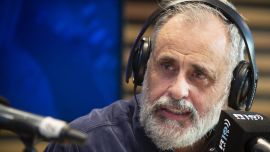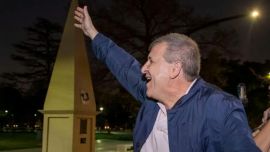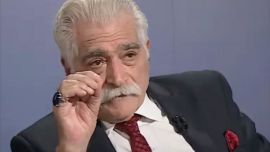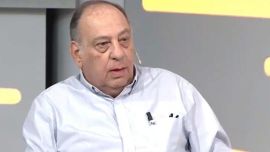One can hardly blame Israel’s Culture Minister Miri Regev for writing “Alberto Fernández” on her hand, in Hebrew letters, as she was waiting for the president to land for his first foreign trip as head of state this week.
Unlike his vice-president, Cristina Fernández de Kirchner, the Peronist leader was, until very recently, little known in the major league of international politics. In fact, having been mostly out of the public limelight since he had quit as Fernández de Kirchner’s Cabinet chief in 2008, Fernández was until recently not even a political brand name for most Argentines.
But the tiny diplomatic incident – which should be interpreted as a forgettable embarrassment on both sides – might actually be an advantage that Fernández can use in his favour as he enters the international arena with one prominent policy issue in his agenda: renegotiating Argentina’s debt.
Read as part of his delicate political balancing act, Fernández’s decision to attend an international commemoration of the Holocaust in Jerusalem – just a handful of days after the fifth anniversary of the violent death of late AMIA special prosecutor Alberto Nisman – amounts to a pro-West gesture in a world increasingly split upon political, ideological and economic lines. By the same token, Fernández did not go to the United States or pick Argentina’s main trade partner Brazil for his first foreign trip, though those are the two capitals where he has already confirmed his ambassadors, respectively Jorge Argüello and Daniel Scioli. Landing in Israel is the closest Fernández’s third way can get to woo Washington and come closer to Brasilia, where ideologues more than pragmatists are running the foreign policy show.
His presidential diplomacy will continue next week, with a longer trip to Europe that so far includes stops at the Vatican and Rome, Madrid, Paris, with Berlin potentially set to be added to the agenda too. As discussed here last week, the president wants to profit from Pope Francis’s global moral standing to push Argentina’s case for a fair debt negotiation (fair meaning making creditors lose some cash). The rest of the tour is designed to garner support at IMF board level, hoping to counterbalance what is likely to be less enthusiastic support for Argentina from Donald Trump’s White House – less, in relative terms, compared with the fervour it showed for the Mauricio Macri administration.
The Fernández government wants to get along well with Washington, but without an automatic alliance. The Iran issue is the clearest example. In her book Sinceramente, presented right at the start of last year’s presidential campaign, Fernández de Kirchner said that the Memorandum of Understanding her government signed with Iran in 2013 was “a geostrategic mistake” and “truly naïve on our part, because we did not take into consideration the geopolitical interests that were at stake.”
The vice-president reportedly encouraged the president to accept the invitation to Israel. Fernández de Kirchner knows that it would take her some time to restore her own reputation in the Western capitals, but also that Fernández will, at least initially, be given the benefit of the doubt.
In the meantime, at policy level the administration is also seeking to cultivate ties with the US on the issues that the Trump White House most cares about. This is a classic Fernández tactic, which dates back to his time as Néstor Kirchner’s Cabinet chief (2003-2007): take care of the key issues, and the rest of the issues will take care of themselves.
This week, for instance, Security Minister Sabina Frederic met with the US ambassador to Argentina, Edward Prado, to discuss counter-terrorism and drug-trafficking, a constant agenda item for bilateral relations. “We learnt more about the work the Embassy is doing in our country,” said Frederic, who described the meeting as “positive.” An anthropologist with a background on human rights, Frederic is one of the people in Fernández’s Cabinet who would technically have a bias by default against close security cooperation with a foreign power. But not anymore.
These first signals point toward a closer alignment with the Western world than might have been assumed at the start. Call it short-term pragmatism, given the country’s desperate need to portray a moderate image ahead of the negotiations with the IMF and Wall Street creditors. But, if the whole thing ends well this year, it might become the new normal for a Peronism that is generating its political identity as it goes.
There will be plenty of time for foreign leaders to learn Alberto Fernández’s name.




















Comments